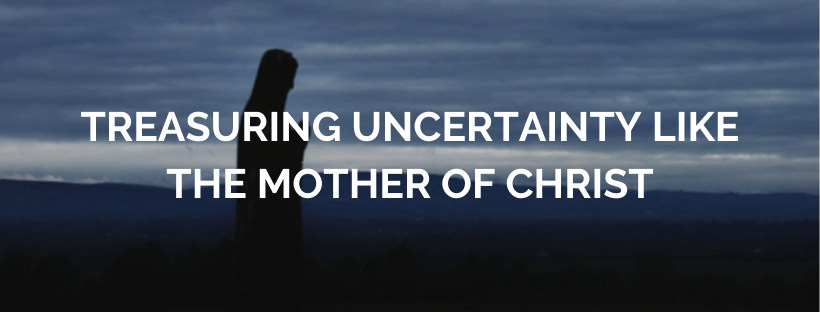Treasuring Uncertainty Like the Mother of Christ

I always get existential around Christmas and New Year’s. I overthink gift-giving: how many, for who, what to get, and why, if it’s enough, and if I am valuing material possessions too much. I worry about crossing the boundary of satisfaction over into the realm of excess and indulgence: that I’m enjoying myself too much and that my happiness makes me selfish. I am constantly trying to discern if I am doing the “right” things with my time and my money.
In Ecclesiastes, Solomon mulls over the meaning of life, work, and gifts, saying,
What gain has the worker from his toil? I have seen the business that God has given to the children of man to be busy with. He has made everything beautiful in its time. Also, he has put eternity into man’s heart, yet so that he cannot find out what God has done from the beginning to the end. I perceived that there is nothing better for them than to be joyful and to do good as long as they live; also that everyone should eat and drink and take pleasure in all his toil—this is God’s gift to man (Ecclesiastes 3:9-13, ESV).
Because I am festive, I also reread the Christmas story. Mary, the mother of Jesus, somehow incorporated all of Solomon’s advice into her acceptance of God’s wild commission for her to conceive and parent one-third of Himself. In a matter of minutes, Mary internalized and accepted the complete destruction and reconstruction of her future and did not seem particularly fazed by that.
Mary intuitively knew how to enjoy the moment as a gift and how to anticipate the future without investing in it too much. She cradled eternity in her heart as easily as blinking:
“My soul magnifies the Lord, and my spirit rejoices in God my Savior, for he has looked on the humble estate of his servant. For behold, from now on all generations will call me blessed; for he who is mighty has done great things for me, and holy is his name. And his mercy is for those who fear him from generation to generation” (Luke 1:47-50, ESV).
Even the patriarchs and their wives often did not respond with this exquisite faith from this heightened objectivity. Sarah laughed when told she would conceive in her old age. Jacob cheated and schemed instead of trusting the Lord’s timing and provision. Moses stuttered But behold; they will not believe me or listen to my voice (Exodus 4:1, ESV). But Mary’s obedience is immediate and meek: she saw far beyond her own history while remaining content with her specific, insane circumstances. Her wisdom and powerful meekness exceeds her youth. It’s astonishing.
Mary, the mother of Jesus, is a Biblical figure we do not necessarily associate with work, but we should. God asked Mary to sacrifice everything she knew — her reputation, her family, her community, her home, her comfort — and she answered almost immediately, Behold, I am the servant of the Lord; let it be unto me according to your word (Luke 1:38, ESV).
In Walking on Water, Madeleine L’Engle discusses Mary’s obedience in the context of art:
I believe that each work of art, whether it is a work of great genius, or something very small, comes to the artist and says, ‘Here I am. Enflesh me. Give birth to me.’ And the artist either says, ‘My soul doth magnify the Lord,’ and willingly becomes the bearer of the work, or refuses; but the obedient response is not necessarily a conscious one, and not everyone has the humble, courageous obedience of Mary (18).
Though L’Engle is discussing art in particular, one could argue that God places an impulse to create in every person. God gifts each person a type of work. Parenting one-third of God must have been painful, baffling work, and it wrecked the concept of a “normal” or “average” life for Mary. And yet, as she rested post-birth, her tiny newborn lying in a food trough, Mary treasured up all these things, pondering them in her heart (Luke 2:19, ESV). And later, when Mary scolded twelve-year-old Jesus for remaining in the temple in Jerusalem after the family left, and he perplexed her with his answer and submission, she treasured up all these things in her heart (Luke 2:51). Instead of seeding bitterness about the weirdness of her life, she chose to mull over the weird things as shreds of an unfolding miracle.
Mary held infinity in her heart and the present moment in her hands. She knew in her heart that everything would be made beautiful in time. Mary must have known that her life as Jesus’ mother would be fraught with peril and pain, but she also chose to soak in the exhilaration of the present moment: sitting in hay in a stranger’s barn with her fiancé, the God-man’s tiny fist gripping her finger.
God gave Mary a weird job, and she decided to enjoy it as much as she could– and that work was God’s gift to her. It takes courage to be fully present in uncomfortable circumstances and to accept gifts we don’t understand. Celebration requires a person to fully inhabit the present moment.
As I take steps into 2020, I’ll keep Mary’s introspection and zest for life tucked away in my own heart. Instead of fearing the unknown, I hope to follow stars and welcome angels into my home; instead of fearing pain, I want to see it as a part of many beautiful, natural cycles in life, much like how the process of birth ends with a child. I will celebrate the things that set me apart instead of allowing my differences to cut me off from joy.
